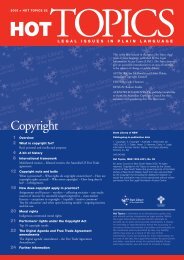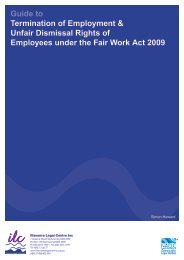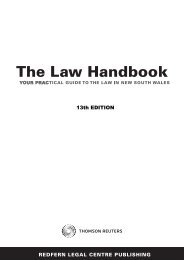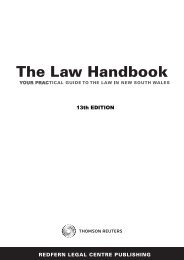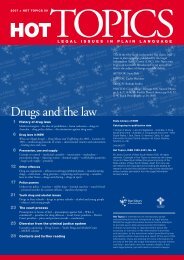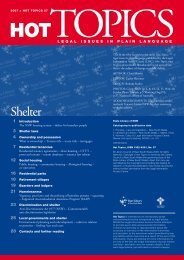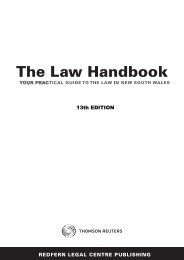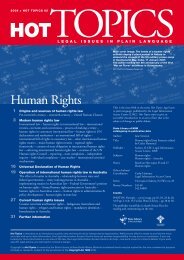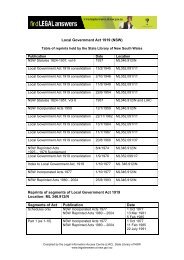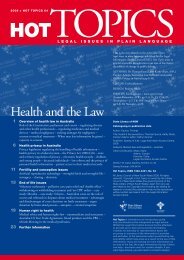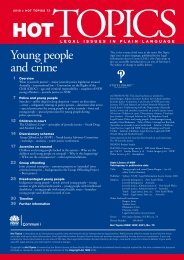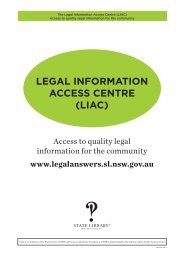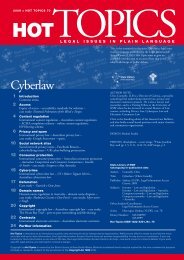Terrorism - Hot Topics 58 - Legal Information Access Centre
Terrorism - Hot Topics 58 - Legal Information Access Centre
Terrorism - Hot Topics 58 - Legal Information Access Centre
- No tags were found...
You also want an ePaper? Increase the reach of your titles
YUMPU automatically turns print PDFs into web optimized ePapers that Google loves.
Some political groups have been falsely linked to Al-Qaeda, in the hope of discrediting them and justifyingharsh and repressive anti-terrorism measures.counter-terrorism measuresSome government counter-terrorism actions havesucceeded only in increasing rather than reducing thethreat of terrorism. In particular, the invasion of Iraq inMarch 2003 by the United States, Britain and Australiawas partly justified on the pretext that Saddam Hussein’sIraq was linked to Al-Qaeda and the sponsorship ofinternational terrorism. Not only have numerous officialinvestigations in the United States and Britain sinceconfirmed that Iraq was not connected to Al-Qaeda,the same investigations also disproved the other keyjustification for war – that Iraq had not disarmedand still possessed weapons of mass destruction. Theoverthrown of Saddam Hussein resulted in the rapidemergence and escalation of terrorism in a country wherepreviously there was none. Despite official assertionsto the contrary, even in late 2006 – more than threeyears after the invasion – Iraq has become an extremelyviolent society, wracked by militant insurgency, ethnic,religious and tribal tensions, and the involvement offoreign terrorists.The US invasion and occupation of an Arab, Muslimcountry fuelled opposition to the US throughout theArab and Muslim world, radicalising those opposed toAmerican policy in the Middle East and encouragingnew recruits to join terrorist groups. In part thesedevelopments are driven by the widespread perceptionthat the US, British and Australian invasion of Iraqwas unlawful under international law, since it wasundertaken neither in self-defence nor authorised bythe UN Security Council (the only two grounds onwhich force may be lawfully used). In addition, reportsand images of US personnel torturing, humiliating,degrading or otherwise mistreating its prisoners at AbuGhraib prison in Iraq, and Guantanamo Bay in Cuba,have also stimulated resistance to American actionsperceived as unlawful or unjust.al-Qaeda attacksThere is no doubt that there is an unknown numberof Al-Qaeda members committed to mounting serious,violent terrorist attacks on the United States and itsallies, including Australia. Since 11 September 2001,there have been large-scale coordinated terrorist attackson civilians in Bali, Kenya, Russia, India, Colombia,Turkey, Morocco, Spain and Britain, along with variousplots thwarted elsewhere. These threats are in additionto those encountered in various anti-terrorist militaryconflicts, such as in Afghanistan since late 2001, Iraqsince early 2003, and in southern Lebanon in 2006.The possibility of terrorists obtaining ‘weapons of massdestruction’ (such as biological, chemical or nuclearweapons), though probably remote, could nonethelesshave very grave consequences.proportionate attentionThe threat of terrorism must, of course, be kept inperspective. Since the 1960s, global casualties ofinternational terrorism have numbered a few thousanddeaths per decade, in contrast to many tens of millionskilled in wars and internal conflicts, by oppressivegovernments, or by disease or famine. Millions of youngchildren die each year from malnutrition and basicdiseases like malaria and tuberculosis, yet their plightdoes not receive the same urgent attention that terrorismhas recently attracted. The fear which terrorism creates,and the fact that it affects western States, partly accountfor the disproportionate attention it receives relative tothe actual harm it causes worldwide.THe TerrOrisT THreaT TO ausTraliaFortunately, Australia has had little history of modernterrorism within its borders, enduring only a minorbombing of a Sydney hotel in 1978, for whichresponsibility has never been established (although anumber of innocent people were wrongly convicted ina serious miscarriage of justice). Neighbouring NewZealand suffered the bombing of the Greenpeace ship,Rainbow Warrior, in Auckland harbour in 1985, inwhich a photographer was killed. Greenpeace hadbeen protesting French nuclear testing in the PacificOcean, and French intelligence agents were found to beresponsible for the bombing and some were convicted ofcriminal offences.In Australia’s region, the extremist Islamic group JemaahIslamiyah has been linked to Al-Qaeda and to the Balibombings of October 2002, which killed 202 people,including 88 Australians. Jemaah Islamiyah is thoughtto be active in a number of countries in the region,including Australia’s neighbour, Indonesia. Nearby thereare also militant groups which use terrorist methods inthe Philippines, southern Thailand, Nepal, Sri Lanka,India, and Pakistan, while China claims that Uighur(Muslim) separatists in the remote province of Xinjiangare terrorists.The Australian government has an official terrorismAlert Level, which since 2001 has told Australians thatthere is a ‘medium’ risk of terrorist attack occurring,defined to mean that ‘a terrorist attack in Australiacould occur’. The Alert Level has never been set at a‘high’ risk of attack, nor at an ‘extreme’ risk. Becauseof its access to and expertise in intelligence gathering,the government clearly has primary competence inevaluating security threats. However, given its remotegeographic location and modest position in internationalaffairs, the threat facing the United States and Britain islikely to be far higher than that facing Australia. Evenso, Al-Qaeda has specifically identified Australia as apossible terrorist target, and Australia’s involvement inIraq and Afghanistan makes it a prominent target.introduction 5



